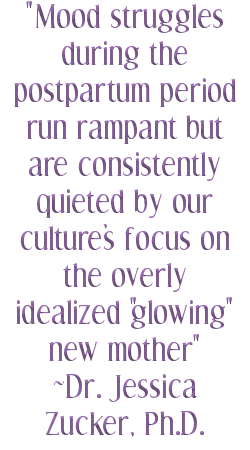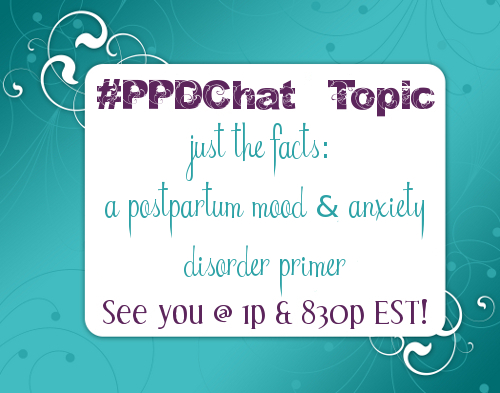 Perinatal mood disorders have been called the most common complication associated with childbirth. Mood struggles during the postpartum period run rampant but are consistently quieted by our culture’s focus on the overly idealized “glowing” new mother. Though many women gracefully transition into mothering, many others feel they are riding an emotional, hormonal, and physiological roller coaster- with no seat belt and no way to control the speed. With the glaring statistic of 15-20 % of mothers developing postpartum depression (not to mention all of the other perinatal mood disorders), it seems imperative that this public health crisis be addressed systematically and globally.
Perinatal mood disorders have been called the most common complication associated with childbirth. Mood struggles during the postpartum period run rampant but are consistently quieted by our culture’s focus on the overly idealized “glowing” new mother. Though many women gracefully transition into mothering, many others feel they are riding an emotional, hormonal, and physiological roller coaster- with no seat belt and no way to control the speed. With the glaring statistic of 15-20 % of mothers developing postpartum depression (not to mention all of the other perinatal mood disorders), it seems imperative that this public health crisis be addressed systematically and globally.
Perinatal and Postpartum Mood Disorder Statistics
• Roughly 10-20% of pregnant women experience depression
• One-half to three-quarters of all new mothers are affected by baby blues
• Approximately 15-20% of all mothers will develop postnatal depression
• Approximately 2-5% of new mothers develop obsessive-compulsive disorder
• About 10% of postpartum women are impacted by panic disorder
• 1-2% of post-delivery women experience postpartum mood disorders with psychotic features (30-50% of women have suffered a postpartum depression or psychotic episode in a prior pregnancy)
• Approximately 10% of men are affected by postpartum mood disorders
Postnatal mental disorders can be incredibly detrimental for infant development and attachment formation. “By 6 months, the infant exposed to a mother’s negative affect learns to extrapolate using that behavior with others. By ten months, the emotional responsivity of infants of depressed mothers is already organized differently from that of normal infants.” Determining primary, secondary, and tertiary preventive approaches to perinatal mood disorders will increase the likelihood of generations of healthy baby-mother attachments.
How do we make burgeoning families more of a healthcare priority? Who routinely has the opportunity to discuss maternal psychological and physical transitions with pregnant and parenting mothers? Through the dissemination of maternal mental health information, preventive education, employing diagnostic screenings, and providing additional supportive resources to women and families, the silence and shame that infiltrate postpartum mood disorders may begin to dissipate. Ideally situated, obstetricians and midwives (among other healthcare practitioners) and their unique relationships with pregnant and parenting women, can provide a way to thoughtfully prevent and carefully identify perinatal mood disorders. Here are some initial thoughts on the impact healthcare providers can have on the lives of pregnant and parenting families with the aim of precluding postpartum mood disorders.
Eight Ways the Obstetrician and/or Midwife Can Make Strides Toward Better Serving Pregnant Women and their Burgeoning Families
1. The obstetrician/midwife should be aware of the potential affects of antenatal mood disorders and maternal stress on fetal development and birth outcomes. Getting appropriate training in postpartum mood disorders will allow families to feel safer in their care.
2. Knowledge of the latest research about the efficacy and safety of psychotropic medications during pregnancy and lactation can facilitate authentic discussions about the risks and benefits if medication is indicated.
3. The obstetrician/midwife has countless opportunities throughout pregnancy and at the postpartum visit to talk with patients and their partners about the various risk factors that contribute to postpartum mood disorders, signs to be concerned about, and available local resources. These discussions can be woven seamlessly into routine appointments and allow the patient to feel more deeply understood. Research states that postpartum mood disorder prognoses are best when identified and addressed immediately.
4. Understandably, many women feel confused and conflicted by feelings of maternal ambivalence or outright unhappiness. The obstetrician/midwife can help normalize various feeling states as well as educate patients about perinatal mood issues and possible treatment options. Addressing psychosocial issues increases trust and patient satisfaction.
5. If women with mood disorders are identified at the initial prenatal visit, a consultation with a psychiatrist needs to become part of their care. Women who have experienced previous postpartum mood disorders are at increased risk for reoccurrence.
6. The American College of Obstetricians and Gynecologists (ACOG) recommends a timely screening method- asking the following questions:
(a) Over the past 2 weeks, have you ever felt down, depressed, or hopeless?
(b) Over the past 2 weeks, have you felt little interest or pleasure in doing things?
These simple questions may provide a springboard for exploring mood related concerns and becomes a way to check in about potential psychosocial issues at each prenatal visit.
7. Pregnant and parenting women should feel that all of their physical and psychological concerns are valid and have a place within the patient-doctor/midwife relationship. Fostering an intimate environment through relational sensitivity and candor may increase the likelihood that women will not suffer in silence.
8 . Obstetrician’s and midwives would benefit patients by routinely providing perinatal mood disorder literature as well as local and national therapeutic resources to women and their families.
Sources:
Perinatal and Postpartum Mood Disorders: Perspectives and Treatment Guide for the Health Care Practitioner (2008) edited by Susan Dowd Stone and Alexis E. Menkins
The Pregnancy and Postpartum Anxiety Workbook (2009) by Pamela Wiegartz
Dr. Jessica Zucker is a psychotherapist in Los Angeles specializing in women’s health with a focus on transitions in motherhood, perinatal and postpartum mood disorders, and early parent-child attachment and bonding. Earning a Master’s degree at New York University in Public Health with a focus on international reproductive issues led to working for the Harvard School of Public Health. After years of international public health work, Dr. Zucker pursued a Master’s degree in Psychology and Human Development at Harvard University with the aim of shifting her work from a global perspective to a more interpersonal focus. Dr. Zucker’s research and writing about various aspects of female identity development and women’s health came to fruition in her award-winning dissertation while completing her Ph.D. in Clinical Psychology. Dr. Zucker is currently writing her first book about mother-daughter relationships and issues surrounding the body (Routledge). For more information: www.drjessicazucker.com






